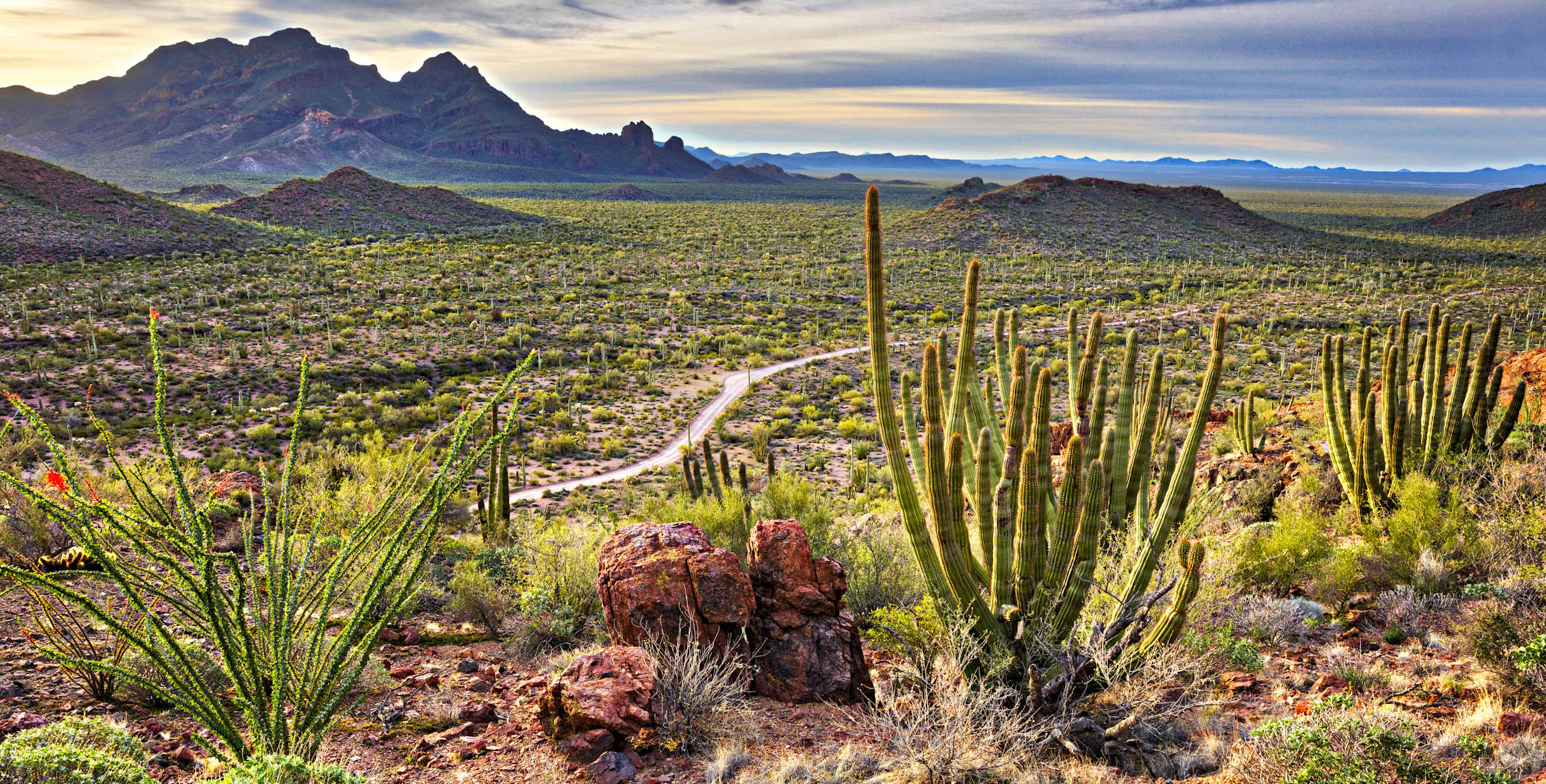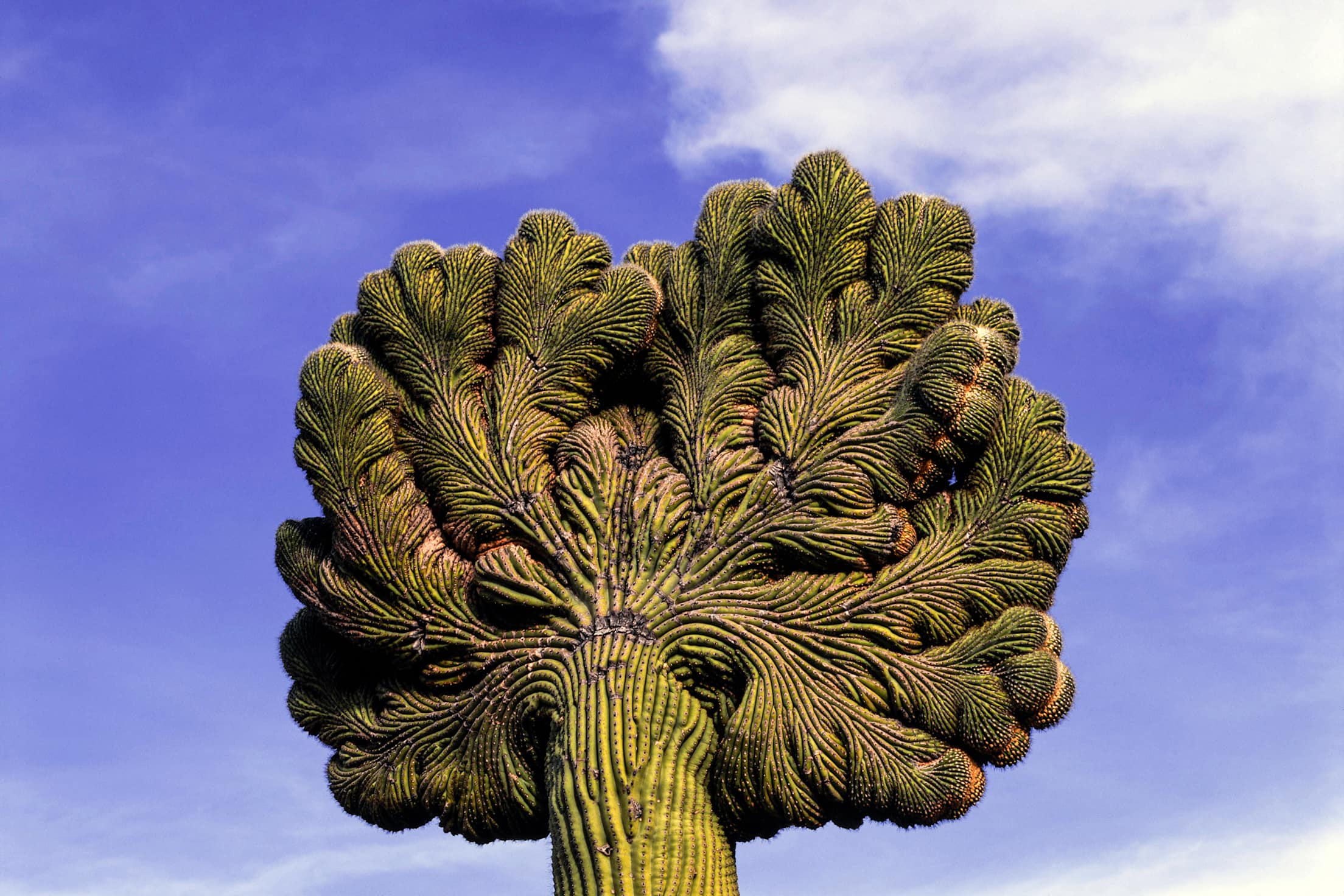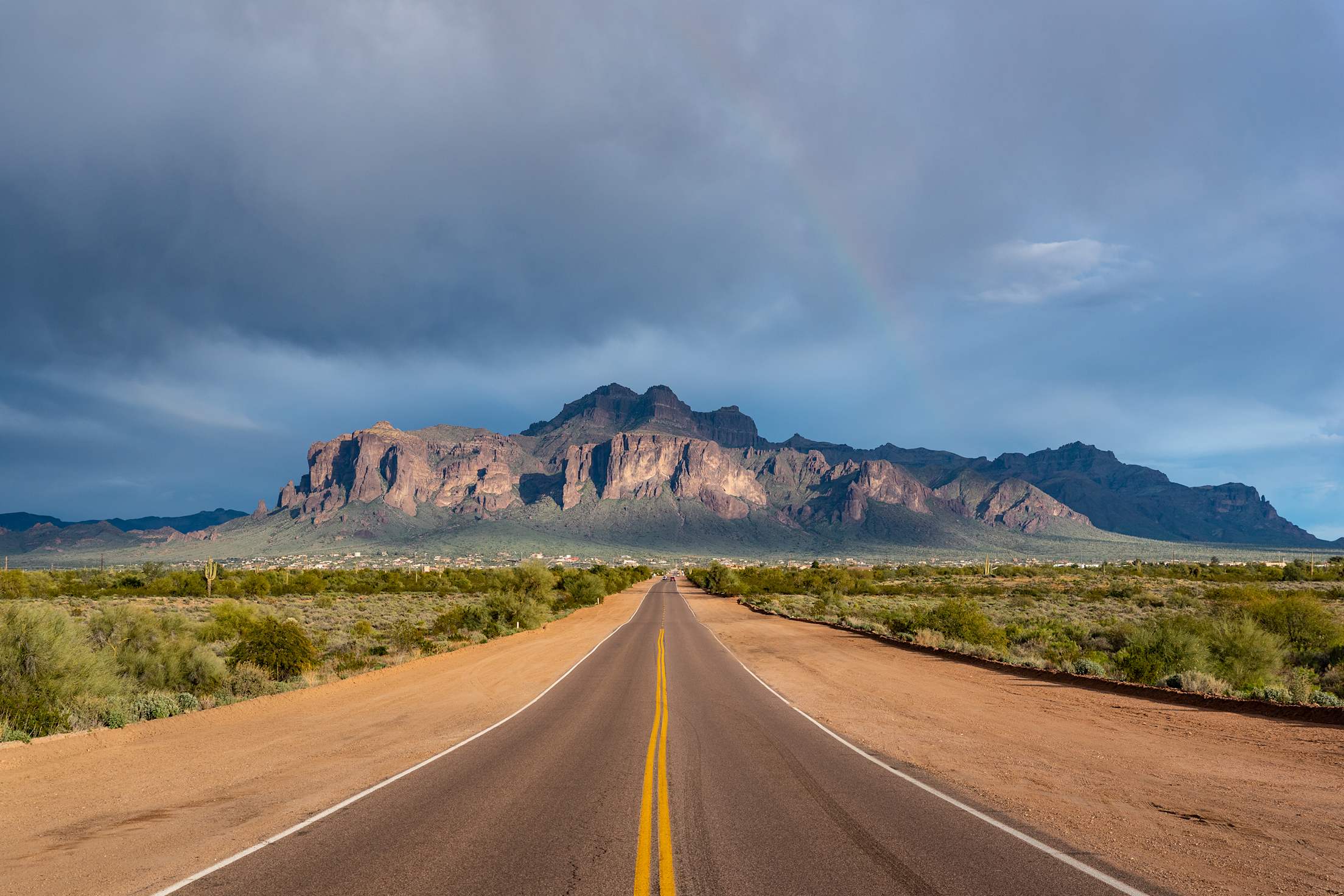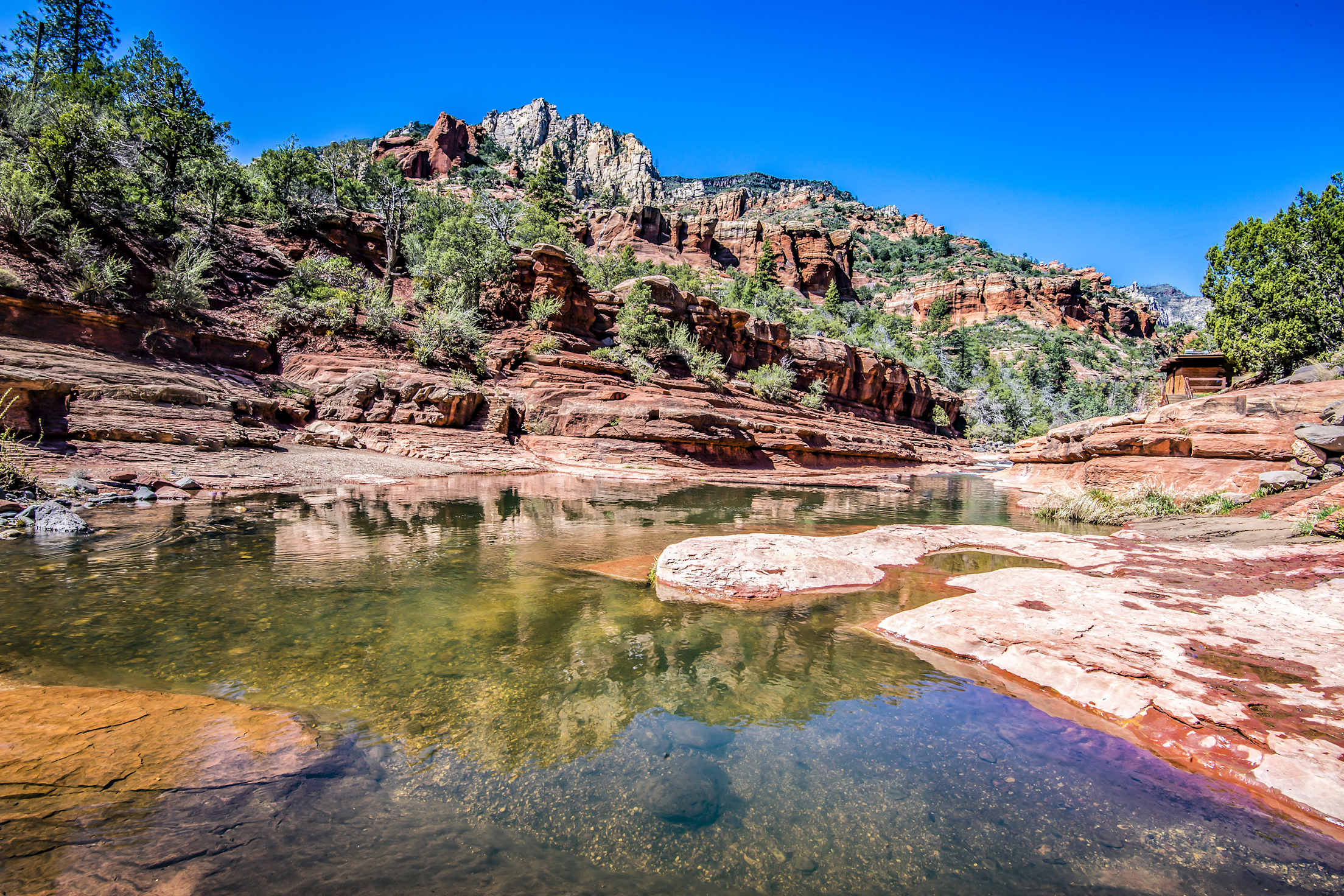
5 Great Arizona Drives
These scenic roadways showcase the state's beauty.

Arizona is home to some of America's most scenic roadways. Striking contrasts—from deserts and volcanic outcroppings to massive canyons, Ponderosa pine-covered mountains, and verdant river valleys—are all within a few hours' reach. For travelers seeking the most impressive views, here are five drives that showcase the state's scenery and diversity.
White Mountain Scenic Road
Miles: 90 round-trip loop
Hours with stops: 2.5–3
The White Mountain Scenic Road begins near Pinetop-Lakeside and winds through the Fort Apache Indian Reservation and Apache-Sitgreaves National Forest along AZ-260. While much of the sacred Apache land remains wilderness just off the highway, the paved drive—meandering through lush meadows, thick pine forests, and along the foot of Mount Baldy—makes it all accessible. Keep your eyes peeled for enormous elk, a population that began being reintroduced to the area from Yellowstone more than 100 years ago.
Take a detour on AZ-373 south for 5 miles to the mountain enclave of Greer. If you drive through town, the road ends along a scenic creek, ideal for a picnic. Greer also is home to the quirky Butterfly Lodge Museum. The log cabin, now on the National Register of Historic Places, was built in 1913 for Western writer, guide, and outdoorsman James Schultz. It offers a glimpse into the rugged Arizona lifestyle of the early 1900s.
Back on AZ-260 before Eagar, make a loop south to zigzag along AZ-261 and AZ-273 before picking up AZ-260 again. Along the way are several lakes, including the 900-acre Sunrise Lake known for its trout fishing. At an elevation of 9,100 feet, this also is a great summer campground.

See crested saguaro in Organ Pipe Cactus National Monument.
Puerto Blanco Drive, Organ Pipe Cactus National Monument
Miles: 37 round-trip loop
Hours with stops: 4
Organ Pipe Cactus National Monument, on Arizona's southern border along AZ-85, is an International Biosphere Reserve and the world's northernmost location for large stands of organ pipe cacti.
The 37-mile Puerto Blanco Drive along the Puerto Blanco Mountains travels deep into the monument and boasts some of the most scenic views of the Sonoran Desert with rugged mountain foothills and a tree-lined oasis fed by underground springs.
Along the drive, you'll find great spots for off-trail hiking with moderate difficulty. One fun hike, about 4 miles into the drive, is Red Tanks Tinaja. On the moderate 30-minute round-trip hike, you'll see holes (tinajas) carved into the red sandstone rocks by seasonal floodwaters.
Along the north section of Puerto Blanco Drive, cars easily can drive the first 5 miles leading to the Pinkley Peak Picnic Area and trailhead. Here, you can take a 1.3-mile off-trail hike to the highest point in the Puerto Blanco Mountains, with views of Arizona to the north and Mexico to the south.
If you have a high-clearance vehicle, continue past the picnic area on the one-way route for 32 more miles along the U.S.-Mexico border and back to AZ-85. There are great picnic spots near the now-abandoned Golden Bell Mine and a half-mile side trip takes you to a rare desert spring at the Quitobaquito Oasis. Along the road you can spot old mines and wells.

Now known as State Route 88, the Apache Trail Historic Road is still unpaved in places.
Apache Trail Historic Road
Miles: 41.5 one way
Hours with stops: 3–5
The Apache Trail was completed in 1905 to aid construction of Roosevelt Dam. Now known as AZ-88, this trek begins with a paved road in Apache Junction and continues to Canyon Lake, where you can hop onboard the Dolly Steamboat for a 90-minute scenic boat ride. Continue along the paved road to Tortilla Flat, home to Superstition Restaurant & Saloon and the Country Store, which serves tasty ice cream.
After Tortilla Flat, the graded dirt road is winding and rough, but spectacular, filled with volcanic landscapes, hairpin turns, steep inclines, and many white-knuckle moments as the road curves past the second reservoir at Apache Lake with the craggy Superstitions in the distance. Passenger cars need to proceed slowly.
An especially impressive part of the drive is the approach to Fish Creek Canyon, where the road drops 1,500 feet in just 3 miles. Roosevelt Lake, completed in 1911, stretches for about 22 miles and is an ideal spot for boating, fishing, hiking, and picnicking. From Roosevelt Lake, take the paved AZ-188 back toward Globe. Just a few miles after you turn onto the pavement, you can stop at Tonto National Monument for a leisurely half-mile hike along a paved path to remarkable historic cliff dwellings
(Editor's note: Tonto National Monument's Cliff Dwelling trails are temporarily closed, and portions of the Apache Trail are currently closed or impassable. Visit azdot.gov for more information and updates.)
Swift Trail Scenic Drive on Mount Graham
Miles: 70 round trip
Hours with stops: 5
Mount Graham in southeast Arizona is home to magnificent centuries-old Douglas firs and Mount Graham International Observatory, which includes three telescopes. Constructed in the 1920s to replace wagon trails, the Swift Trail (AZ-366) runs from the saguaro-studded Gila Valley up to the 9,000-foot peaks of the Pinaleño Range in Coronado National Forest. This drive starts south of Safford and ascends 35 miles through the same ecosystems you would see on a drive from Mexico to Canada—desert landscapes, grasslands, woodlands, and Ponderosa pine forests. The first half of the drive is open year round, but closes to motorized vehicles near Shannon Campground from Nov. 15 through April 15. The last 13 miles is graded dirt, but accessible to passenger vehicles.
One of the area's best day hikes is to Heliograph Peak from Shannon Campground. The historic mountaintop held signal mirrors during the Apache Wars of the 1880s and offers breathtaking views across the Gila Valley.

Cool off in Oak Creek at Slide Rock State Park.
Oak Creek Canyon Scenic Drive
Miles: 14.5 one way
Hours with stops: 2.5
Oak Creek Canyon Scenic Drive was the state's first scenic road, created along an old cattle trail, and is still one of its most popular. The drive follows AZ-89A from south of Flagstaff, along Oak Creek Canyon, and into Sedona. As you leave Flagstaff, stop at Oak Creek Canyon Vista for stunning views of the Mogollon Rim and the canyon. You'll also find an American Indian marketplace that sells authentic turquoise and silver jewelry. If you want to park and hike the canyon, you will need to purchase a Red Rock Pass. Passes are available from self-serve kiosks at Oak Creek Canyon Vista and most major trailheads or at myscenicdrives.com/store. Along the drive there are plenty of scenic overlooks, hiking trails, and picnic areas.
You'll want to check out two popular swimming holes along this route—Grasshopper Point and Slide Rock State Park. Both are busy in summer months when desert-dwellers head north for cool mountain streams.